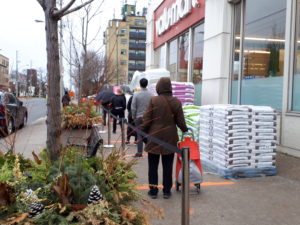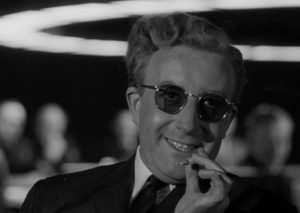April 3: A couple of days ago, I encountered a strange new world while going to the grocery store. People were quietly waiting outside the doors, stationed the mandatory 2 meters apart. I’m sure that many of you have had a similar experience. As we all navigate our way through the COVID19 epidemic, I have heard many people make comparisons to war: we are mobilizing to face a common enemy; industry is being conscripted to produce materials we need to continue the fight; people are being asked to sacrifice comfort, personal freedoms and perhaps their very lives for the “common good”.
 While the analogy to war may be apt, most of us have no direct experience of war beyond the stories of our parents to draw upon. But as I thought about it a bit more I realized that there are perhaps parallels to the level of anxiety many of us felt during the 1962 Cuban Missile Crisis.
While the analogy to war may be apt, most of us have no direct experience of war beyond the stories of our parents to draw upon. But as I thought about it a bit more I realized that there are perhaps parallels to the level of anxiety many of us felt during the 1962 Cuban Missile Crisis.
I was 12 years old and in Grade 7 at Deer Park School. I was old enough to understand some of the issues that triggered the crisis and, while I knew that it was “a big deal”, I think that I was young enough that I didn’t pay much attention. In time, the ominous newspaper headlines, TV broadcasts and the generalized angst I felt in the adults around me began to permeate my thoughts. Even as relatively young children, I think that, as the crisis deepened day-by-day, we all knew on some level that we would not survive an attack if it were to happen.
In preparation for a possible attack, the government began testing the air raid sirens. This seemed to happen at random intervals and underscored in me the idea that an attack could happen at any time and without warning. Preparations and drills started at the school and I’m pretty sure that my parents were making ready at home as well. I recall the anxiety I felt if I was separated from them for very long. I think we all realized that if an attack happened, we wouldn’t be able to run home from school to Mum and Dad. We would likely face the consequences alone.
 As students in Grade 7, we were in a room on the second floor of the school. When the alarm was sounded, we left our classroom and went down to the ground floor hallway (actually a 1/2 below grade level) where we were told to sit with our backs against the wall. One of the students asked a teacher whether there was a basement level, and whether we wouldn’t be safer down there. She replied that there was a basement, but if there was an attack, the swimming pool would flood the basement and we would all drown. Even as 12-year-old’s we clearly understood that an attack would mean the end of us, either by drowning or being blasted to smithereens.
As students in Grade 7, we were in a room on the second floor of the school. When the alarm was sounded, we left our classroom and went down to the ground floor hallway (actually a 1/2 below grade level) where we were told to sit with our backs against the wall. One of the students asked a teacher whether there was a basement level, and whether we wouldn’t be safer down there. She replied that there was a basement, but if there was an attack, the swimming pool would flood the basement and we would all drown. Even as 12-year-old’s we clearly understood that an attack would mean the end of us, either by drowning or being blasted to smithereens.
Over the next 14 days or so, the tensions ratcheted up. The crisis began to feel like standing too close to the tracks as a freight train passes. And just like the train ends, Russia blinked, and the crisis ended on October 28. Life returned to “normal”. I think for many of my generation it was a defining moment that introduced us to “global politics” and the realization that so much of what happened around us had huge consequences that were totally beyond our control.
Much of that feels quite familiar in a COVID19 environment. News and television reports highlight the most recent bad news. Things are changing rapidly and seemingly at random. We’re told to take measures to prepare for the worst, and there is a sense of inevitability as the pandemic spreads. While many people – like me – perhaps naively believe that there is a relatively low chance of contracting the disease, there is a level of anxiety in our society that I have not seen since ’62. Every conversation begins with 20 minutes of discussion about the latest developments or miracle cures or how to sanitize your groceries. It’s relentless.
In the end, the pandemic will end. Unlike the Cuban Missile Crisis which ended on a specific date, the pandemic is likely to ebb and flow for a while (perhaps as long as 2 years). Although changed forever in many ways, life will return to normal – whatever that might be. In the meantime, pack your patience, and keep your distance.